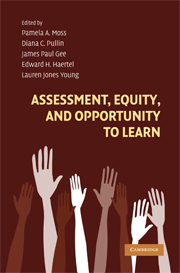Book contents
- Frontmatter
- Contents
- Preface
- List of Contributors
- ASSESSMENT, EQUITY, AND OPPORTUNITY TO LEARN
- 1 Introduction
- 2 Assessment Through the Lens of “Opportunity to Learn”
- 3 A Sociological Perspective on Opportunity to Learn and Assessment
- 4 A Sociocultural Perspective on Opportunity to Learn
- 5 Individualizing Assessment and Opportunity to Learn
- 6 Cultural Modeling as Opportunity to Learn
- 7 Opportunities to Learn in Practice and Identity
- 8 Game-Like Learning
- 9 Sociocultural Implications for Assessment I
- 10 Issues of Structure and Issues of Scale in Assessment from a Situative/Sociocultural Perspective
- 11 Sociocultural Implications for Assessment II
- 12 Assessment, Equity, and Opportunity to Learn
- Index
- References
12 - Assessment, Equity, and Opportunity to Learn
Published online by Cambridge University Press: 05 June 2012
- Frontmatter
- Contents
- Preface
- List of Contributors
- ASSESSMENT, EQUITY, AND OPPORTUNITY TO LEARN
- 1 Introduction
- 2 Assessment Through the Lens of “Opportunity to Learn”
- 3 A Sociological Perspective on Opportunity to Learn and Assessment
- 4 A Sociocultural Perspective on Opportunity to Learn
- 5 Individualizing Assessment and Opportunity to Learn
- 6 Cultural Modeling as Opportunity to Learn
- 7 Opportunities to Learn in Practice and Identity
- 8 Game-Like Learning
- 9 Sociocultural Implications for Assessment I
- 10 Issues of Structure and Issues of Scale in Assessment from a Situative/Sociocultural Perspective
- 11 Sociocultural Implications for Assessment II
- 12 Assessment, Equity, and Opportunity to Learn
- Index
- References
Summary
Although assessment has a long history in American education, at no time in the nation's history has it been so prominent and pervasive as it is today. Due to state initiatives and the No Child Left Behind Act of 2001 (NCLB) (P.L.107–110, 2002), externally mandated testing is currently seen as the primary means of driving education reform, a means through which evidence-based decisions can be made to achieve accountability, allocate resources, inform parents and taxpayers, and credential educators. This is in addition to the longstanding and widespread use of tests to determine placement of individuals in special education or gifted programs, grade-to-grade promotion, certification for graduation, allocation of scholarships and vouchers, special intervention in instructional programs, accreditation of schools, and higher education admissions. Testing, however, is only one type of educational assessment, and in the nation's schools there are a wide range of assessment practices used by teachers and other educators, the primary users of assessment information and the primary providers of learning opportunities to students. The work represented in this volume is intended to challenge our understandings of the roles of assessment in schools and to reform our perspectives on the relationships between assessment, learning, and the provision of meaningful learning opportunities.
- Type
- Chapter
- Information
- Assessment, Equity, and Opportunity to Learn , pp. 333 - 352Publisher: Cambridge University PressPrint publication year: 2008
References
- 6
- Cited by



